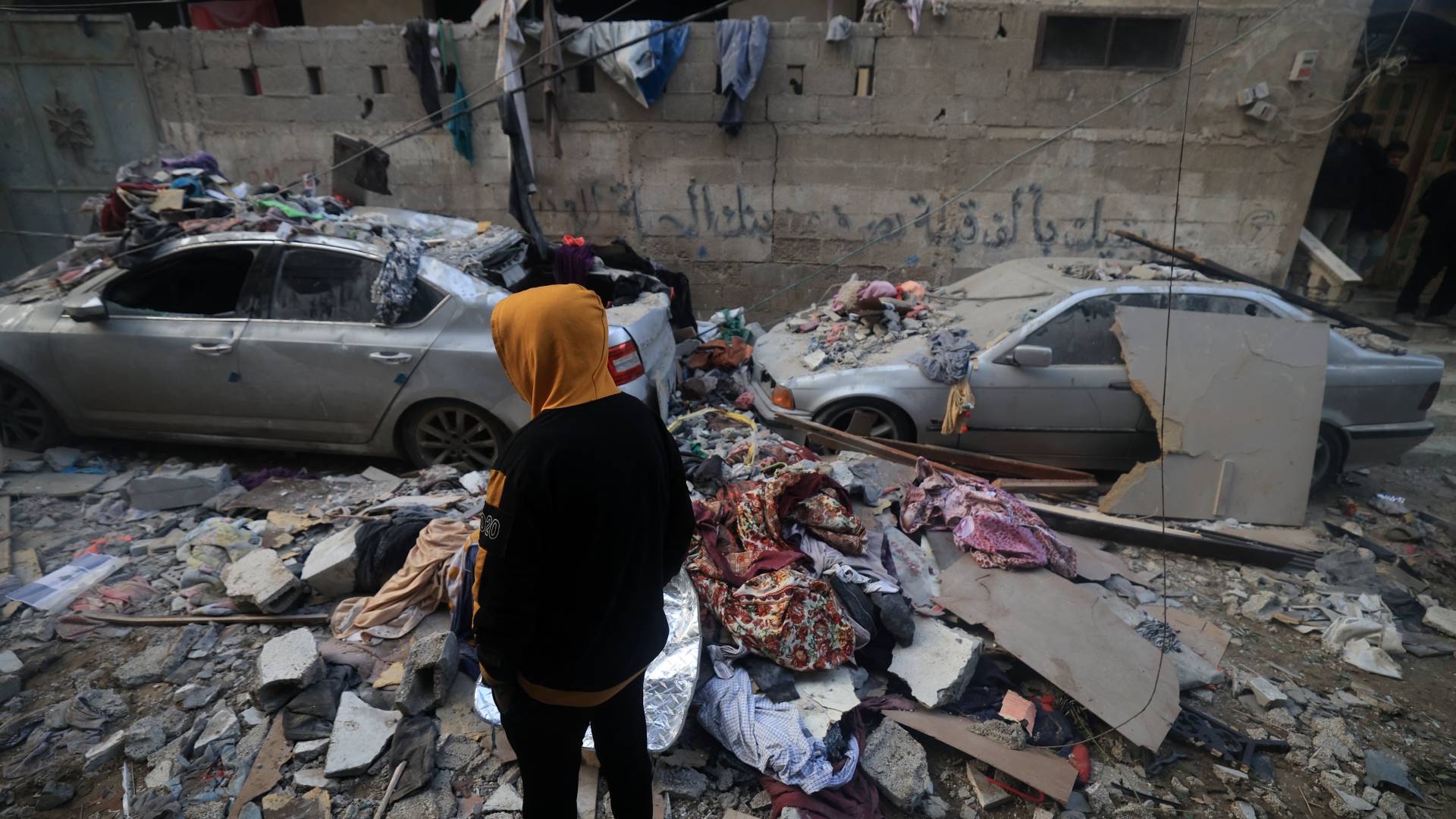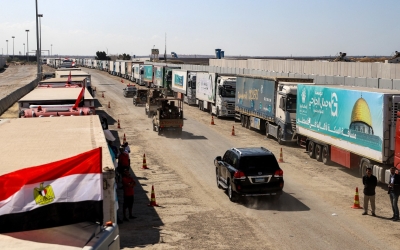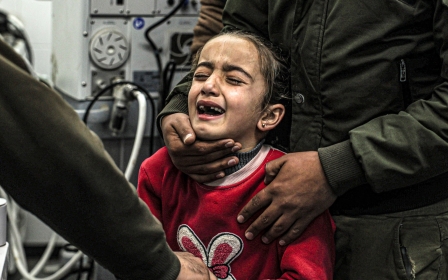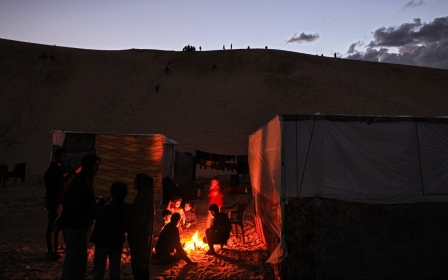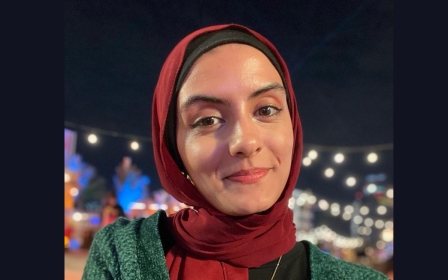MI5 tried to recruit British man in Gaza by offering to help family escape
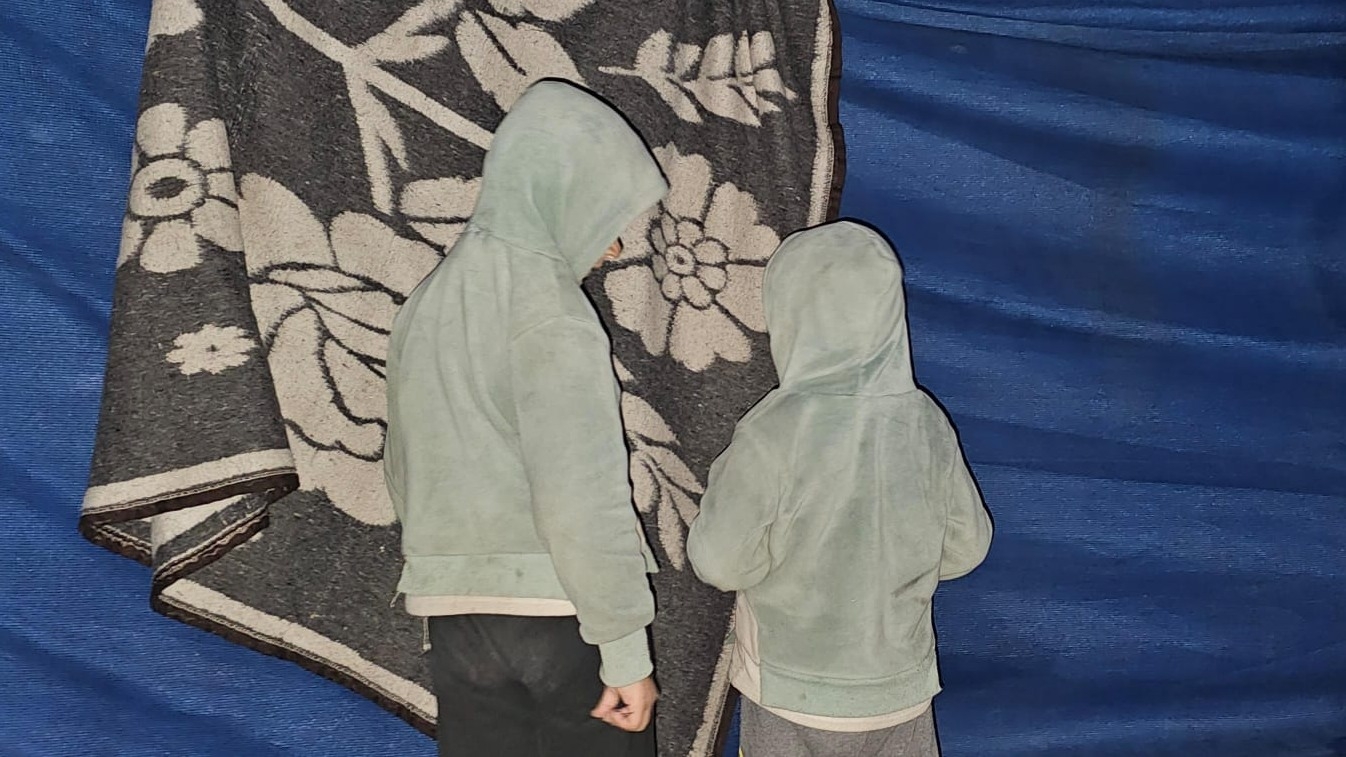
A British man stranded in Rafah with his young family has told Middle East Eye that MI5 offered to help them to escape from Gaza but only if he agreed to work for the spy agency.
The man, who said he did not accept the offer, now fears that his displaced family – who include a one-year-old daughter with a serious medical condition, and two other young children – is in imminent danger from an expected Israeli offensive and a humanitarian crisis that is worsening by the day.
He said the family, which MEE is not identifying because of the sensitivity of their case, has registered with the Foreign, Commonwealth and Development Office (FCDO), which has helped scores of British nationals to leave Gaza via the Rafah crossing to Egypt, but has been kept waiting for weeks.
“I thought it would only take a few days or a week at most. I have been waiting for more than two months for them to get me and my family out of this crazy, dangerous war,” he said.
The family has been living in a tent, among hundreds of thousands of others displaced from other devastated areas of Gaza, since being forced to flee their home in the Nuseirat refugee camp in December in conditions which United Nations secretary general Antonio Guterres on Thursday described as a “humanitarian nightmare”.
New MEE newsletter: Jerusalem Dispatch
Sign up to get the latest insights and analysis on Israel-Palestine, alongside Turkey Unpacked and other MEE newsletters
The man said that many of his Palestinian wife’s family, including her mother, her brother and several of his children, had been killed by Israeli bombing, and their home was subsequently destroyed by an Israeli missile.
The names of people crossing from Gaza to Egypt have to be approved by both Israeli and Egyptian authorities. On Friday, the man told MEE that his children, who are aged six, four, and one, had been added to a list of those allowed to leave, but that he and his wife had still not been granted permission.
The man said his youngest daughter’s medical condition required regular medication and treatment that they had not had access to since the beginning of the war. He said he had sent medical reports to the FCDO in the hope that this would expedite the family’s evacuation – but to no avail.
“Issuing permission to my children without me and their mother is absurd,” he said.
“The children are still young and largely dependent on their mother’s care. The little girl is still breastfeeding. At least let their mother go with them. This is the least of my children's rights.”
The man’s relatives in the UK, who include his mother and his sister, have also been in regular contact with the FCDO to call for the family to be provided with urgent assistance.
Members of the family have proposed travelling to Egypt to care for the children if plans can be made to get them across the border. But they say the FCDO has told them that it cannot help at the border, or with the children's onward travel to Cairo.
The man’s sister told MEE: “We are expecting the worst news to drop on us at any time. It has taken a huge mental toll on all of us. We have received no help from the British government.”
Gareth Peirce, a senior partner at law firm Birnberg Peirce who is also advocating on behalf of the family, told MEE: “We have been doing everything we can, but at every step, the Foreign Office has been saying there is nothing they can do.
“Our contention is that that can’t be right. They could get any of the family out by offering practical help. They could confirm any question about their identity. And although they are saying they can’t do anything in practical terms, MI5 was saying exactly the opposite six weeks ago.”
'Still British'
The man, who has lived in Gaza for the past decade, told MEE he had been contacted earlier in the war via a phone messaging app by someone who identified himself as working for MI5. He believes the messages are authentic because they referred to a previous encounter he’d had with an MI5 officer at an airport in 2013.
The messages, he said, expressed concern for the safety of the family, suggested that they could help each other, and proposed that they should keep in touch, stressing that he was “still British”.
In December, as the situation for the family was becoming increasingly desperate, the man replied to say that he wanted to take his wife and children to the UK but needed help sorting out their documentation.
He was advised by the MI5 contact to register with the FCDO which was responsible for organising evacuations. But in subsequent messages, the contact stressed that his ability to help the family was conditional on the man agreeing to work for the intelligence agency.
MI5, the contact said, had influence over the FCDO but only if he could show “there is willingness from your side about working together”.
The man said he did not respond to this message.
“After I received their offer, I said to myself: the UK is a country of institutions and law, and they will not obstruct the evacuation of me and my family because I did not respond to MI5's proposal. But unfortunately, I was wrong.”
MEE contacted both the Home Office, which handles media queries regarding MI5, and the FCDO for comment.
A government spokesperson told MEE, "We are working with the Israeli and Egyptian authorities to ensure any remaining British nationals and other eligible people still in Gaza that want to leave are cleared to cross as soon as possible."
Moazzam Begg, a senior director at advocacy organisation Cage International and a former Guantanamo Bay detainee, who is also assisting the family, told MEE that the messages appeared consistent with methods used by British intelligence agencies to recruit people facing desperate situations.
Begg said: “I know from personal experience from MI5 agents telling me directly that the only way you can get out of a place where you are being tortured or abused or detained without trial is by cooperating.
“Even despite that I find it extraordinary, knowing the spotlight is on Gaza, that they would say they know his situation but they can’t help him unless he works for them. I find that unbelievably outrageous.”
Concerns for the family’s safety have grown in recent days amid expectations that Israel is set to launch a full-scale military assault on Rafah, which was targeted overnight by Israeli air strikes.
On Friday, Israeli Prime Minister Benjamin Netanyahu said he had ordered military officials to prepare a plan to evacuate civilians from the southern city and to launch a ground offensive into the former safe zone where the UN says around 1.9 million Palestinians have sought refuge.
Almost 28,000 people have been killed and more than 67,000 wounded since Israel's war against Hamas started in October, according to the Palestinian health ministry.
Philippe Lazzarini, the head of Unrwa, the UN agency for Palestinian refugees, told reporters on Friday that there was "growing anxiety and growing panic" in the city, with Palestinians having "absolutely no idea where to go after Rafah".
"Any large-scale military operation among this population can only lead to an additional layer of endless tragedy that’s unfolding," Lazzarini said.
This article is available in French on Middle East Eye French edition.
Middle East Eye delivers independent and unrivalled coverage and analysis of the Middle East, North Africa and beyond. To learn more about republishing this content and the associated fees, please fill out this form. More about MEE can be found here.


